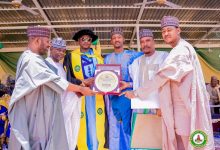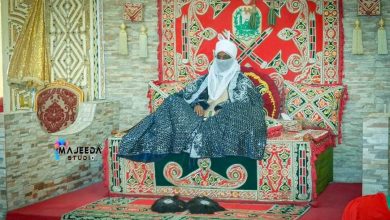Kano State Government to Introduce Quranic Education for Children Ages 17 to 25, Announced by Senator Kwankwaso

Kano State Government to Introduce Quranic Education for Children Ages 17 to 25, Announced by Senator Kwankwaso
Introduction
In a progressive move, the Kano State Government has announced its plans to introduce Quranic education for young individuals aged 17 to 25. This significant initiative, disclosed by Senator Kwankwaso, represents a commendable step towards enhancing access to Quranic education and empowering the youth in the state. In this blog post, we’ll delve into the details of this initiative and its potential impact.

Empowering Youth through Quranic Education
The Kano State Government, under the leadership of Senator Kwankwaso, is taking a bold step in expanding educational opportunities for the youth. The initiative focuses on providing Quranic education to individuals between the ages of 17 and 25, recognizing the importance of ensuring that this age group has access to religious education.
The Vision of the Program
This program aims to provide a platform for Quranic education, enabling young learners to deepen their understanding of the Quran and Islamic studies. It aligns with the government’s commitment to creating educational opportunities for all and fostering religious growth among the youth.
Support from Sheikh Professor Isa Ali Pantami
Sheikh Professor Isa Ali Pantami, a prominent figure in the Islamic community, has endorsed this initiative. He has expressed his approval for the Kano State Government’s effort to expand access to Quranic education. The Sheikh’s support adds credibility and importance to the program, emphasizing the significance of religious education in nurturing the faith and knowledge of the youth.
A Note of Appreciation
Comr Abba Sani Pantami, the individual who shared this news, expressed gratitude and offered prayers for the success of this initiative. It is heartening to see support and appreciation from various quarters, highlighting the unity and commitment to empowering the youth through Quranic education.
Empowering Youth through Quranic Education
Education is often considered the key to empowerment and personal growth, and this holds true for all forms of education, including religious education. One essential aspect of religious education is Quranic education, which plays a vital role in the lives of many individuals, particularly in Islamic communities. In this blog post, we will explore the significance of Quranic education in empowering youth, fostering spiritual growth, and shaping a brighter future.
The Power of Quranic Education
Quranic education, which primarily focuses on understanding the Quran and the teachings of Islam, is a profound and transformative experience. It serves as a spiritual and moral compass for many, guiding their actions and decisions in life. Beyond its religious importance, Quranic education offers numerous benefits, especially when provided to youth.
- Spiritual Growth: Quranic education nurtures the spiritual growth of young learners. It provides them with a deeper understanding of their faith, fostering a sense of connection with their religion and a stronger relationship with God.
- Moral Development: The Quran teaches valuable moral lessons and ethical principles. Quranic education instills these values in youth, encouraging them to make ethical choices and contribute positively to their communities.
- Cultural Preservation: Quranic education is a vital tool in preserving cultural and religious traditions. It ensures that the rich heritage of a community is passed down to the next generation.
- Community Building: Quranic education brings youth together, fostering a sense of community and unity. It provides an environment for young learners to connect with peers who share similar values and beliefs.
Empowering the Youth
Empowering youth through Quranic education goes beyond religious instruction. It equips them with skills and knowledge that are valuable in various aspects of life:
- Critical Thinking: Quranic education encourages critical thinking, reflection, and interpretation. These skills are transferable to other areas of education and life.
- Communication Skills: Reciting and studying the Quran enhances oral communication skills, which are valuable in public speaking and interpersonal interactions.
- Language Proficiency: Quranic education often includes Arabic language instruction, which can be beneficial for understanding the Quran and also for language proficiency in general.
- Cultural Awareness: It fosters cultural awareness and intercultural understanding, which is vital in an increasingly diverse world.

The Vision of the Program: Empowering Youth Through Quranic Education
Every meaningful educational initiative starts with a clear vision, a goal to create positive change and empower the participants. In the case of Quranic education for youth, the vision is fundamental to the program’s success. In this blog post, we’ll explore the vision behind empowering youth through Quranic education and the transformative impact it can have on individuals and communities.
The Vision: A Holistic Approach to Education
The central vision of Quranic education for youth is to provide a holistic approach to education that combines both religious and secular knowledge. This approach recognizes the importance of fostering well-rounded individuals who are not only grounded in their faith but also equipped with the skills and values to navigate life’s challenges.
Key Aspects of the Vision
- Religious Growth: At its core, the vision is about nurturing the spiritual growth of young learners. It aims to deepen their understanding of the Quran, the teachings of Islam, and the values associated with the faith.
- Moral and Ethical Development: The program seeks to instill strong moral values and ethical principles. These values serve as a guide for making ethical decisions and becoming responsible members of society.
- Cultural Preservation: The vision also includes the preservation of cultural and religious traditions. By passing down the rich heritage of a community, the program ensures that cultural practices and religious customs are upheld and celebrated.
- Community Building: Quranic education fosters a sense of community and unity. The vision encourages young learners to connect with their peers, building a support network based on shared values and beliefs.
The Impact: Empowered Youth
The vision behind empowering youth through Quranic education extends beyond the classroom. It envisions a future where youth are empowered in multiple ways:
- Critical Thinking: By encouraging critical thinking and interpretation of religious texts, the program equips youth with the ability to approach challenges with a thoughtful and analytical mindset.
- Communication Skills: Reciting and studying the Quran enhances oral communication skills, valuable for public speaking and interpersonal relationships.
- Language Proficiency: Many Quranic education programs include Arabic language instruction, benefiting both religious understanding and general language proficiency.
- Cultural Awareness: The vision fosters cultural awareness and intercultural understanding, which are essential in an increasingly diverse world.
Conclusion
The Kano State Government’s decision to introduce Quranic education for young individuals aged 17 to 25 is a significant step forward in promoting religious education and empowering the youth. Senator Kwankwaso’s leadership and the endorsement from Sheikh Professor Isa Ali Pantami underline the importance of this initiative.
As this program takes shape, it holds the promise of equipping young learners with a deeper understanding of the Quran and Islamic studies, allowing them to grow spiritually and contribute positively to their communities. This initiative stands as a beacon of hope and an investment in the future of Kano State, emphasizing the significance of religious education and the youth’s role in shaping a better society.







